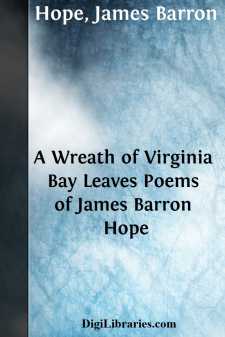Categories
- Antiques & Collectibles 13
- Architecture 36
- Art 48
- Bibles 22
- Biography & Autobiography 813
- Body, Mind & Spirit 142
- Business & Economics 28
- Children's Books 16
- Children's Fiction 13
- Computers 4
- Cooking 94
- Crafts & Hobbies 4
- Drama 346
- Education 46
- Family & Relationships 57
- Fiction 11829
- Games 19
- Gardening 17
- Health & Fitness 34
- History 1377
- House & Home 1
- Humor 147
- Juvenile Fiction 1873
- Juvenile Nonfiction 202
- Language Arts & Disciplines 88
- Law 16
- Literary Collections 686
- Literary Criticism 179
- Mathematics 13
- Medical 41
- Music 40
- Nature 179
- Non-Classifiable 1768
- Performing Arts 7
- Periodicals 1453
- Philosophy 64
- Photography 2
- Poetry 896
- Political Science 203
- Psychology 42
- Reference 154
- Religion 513
- Science 126
- Self-Help 84
- Social Science 81
- Sports & Recreation 34
- Study Aids 3
- Technology & Engineering 59
- Transportation 23
- Travel 463
- True Crime 29
A Wreath of Virginia Bay Leaves Poems of James Barron Hope
Description:
Excerpt
INTRODUCTION.
It has been claimed for James Barron Hope that he was "Virginia's Laureate." He did not deal in "abstractions, or generalized arguments," or vague mysticisms. He fired the imagination purely, he awoke lofty thoughts and presented, through his noble odes that which is the soul of "every true poem, a living succession of concrete images and pictures."
James Barron, the elder, organized the Virginia Colonial Navy, of which he was commander-in-chief during the Revolution, and his sons, Samuel and James, served gallantly in the United States Navy. It was from these ancestors that James Barron Hope derived that unswerving devotion to his native state for which he was remarkable, and it was at the residence of his grandfather, Commodore James Barron, the younger, who then commanded the Gosport Navy-yard, that he was born the 23d of March, 1829.
His mother, Jane Barron, was the eldest daughter of the Commodore and most near to his regard. An attractive gentlewoman of the old school, generous, of quick and lively sympathies, she wielded a clever, ready pen, and the brush and embroiderer's needle in a manner not to be scorned in those days, and was a personage in her family.
Her child was the child not only of her material, but of her spiritual being, and the two were closely knit as the years passed, in mutual affection and confidence, in tastes and aspirations.
His father was Wilton Hope of "Bethel," Elizabeth City County, a handsome, talented man, a landed proprietor, of a family whose acres bordered the picturesque waters of Hampton River.
He gained his early education at Germantown, Pennsylvania, and at
the "Academy" in Hampton, Virginia, under his venerated master, John
B. Cary, Esq.,—the master who declares himself proud to say,
"I taught him"—the invaluable friend of all his after years.
In 1847 he graduated from William and Mary College with the degree of A.B.
From the "Pennsylvania," upon which man-of-war he was secretary to his uncle, Captain Samuel Barron, he was transferred to the "Cyane," and in 1852 made a cruise to the West Indies.
In 1856 he was elected Commonwealth's attorney to the "game-cock town of Virginia," historic and picturesque old Hampton, which was the centre of a charming and cultivated society and which had already claimed him as her "bard." For as Henry Ellen he had contributed to various southern publications, his poems in "The Southern Literary Messenger" attracting much gratifying attention.
In 1857 Lippincott brought out "Leoni di Monota and Other Poems." The volume was cordially noticed by the southern critics of the time, not only for its central poem, but also for several of its minor ones, notably, "The Charge at Balaklava," which G.P.R. James—as have others since—declared unsurpassed by Tennyson's "Charge of the Light Brigade."
Upon the 13th of May, 1857, he stood poet at the 250th anniversary of the English settlement at Jamestown.
As poet, and as the youthful colleague of Henry A. Wise and John R. Thompson, he stood at the base of Crawford's statue of Washington, in the Capitol Square, Richmond, Virginia, the 22d of February, 1858....


